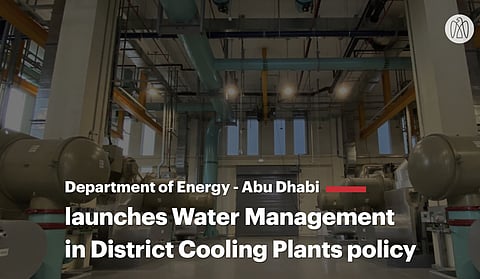DoE Launches Water Management in District Cooling Plants Policy
In a bid to regulate and ensure the energy sector’s sustainability in Abu Dhabi, and in accordance with international best practices and standards, the Department of Energy – Abu Dhabi (DoE) has announced its new Water Management in District Cooling Plants policy.
This new policy supports and continues the DC Regulatory Framework that it issued in 2019.
The new policy aims to regulate the mechanism of identifying potential sources of water that can be used by district cooling providers, such as recycled water, desalinated water, and sea water.
This would allow for the use of low-cost sources that have been deemed to be of acceptable quality after evaluating their capital and operational economic feasibility.
Veolia Reduces Carbon and Water Footprint of Pınar Süt at Izmir Plant
It will also pave the way for evaluation of its compatibility with water discharge standards and environmental regulations to ensure their suitability for use in district cooling systems.
Under the new policy, water sources can be used in district cooling systems if they prove to be the most feasible and cost-effective source.
This requires prior planning in accordance with relevant water codes as well as ensuring availability of installations needed to meet the demand. The policy allows for a blend of water sources, provided the quality levels required for district cooling plant operations are met.
H.E. Eng Ahmed Mohammed Al Rumaithi, Undersecretary, DoE said: “To implement Abu Dhabi’s Demand-Side Management and Energy Rationalization 2030 Strategy, we continue to enable initiatives that support energy efficiency and help protect consumers and environment.
"District cooling is one of the most critical areas that contribute significantly to achieving energy efficiency, providing 9 per cent in overall energy savings against BAU baseline value.”
His Excellency pointed out that the Water Management in District Cooling Plants policy helps overcome water sustainability challenges through cooperation among concerned entities to find appropriate alternatives that support district cooling operations in the emirate.
Carlos Gascó Travesedo, Acting Executive Director of Energy Policy at DoE, said: “District cooling is known for its low electricity consumption, which reduces pressure on the infrastructure required to generate electricity.
"It also mitigates fuel, operation, and maintenance costs of power stations, ensuring high savings in energy, cost reduction and environmental protection.
"At the same time, these systems consume substantial amounts of water to compensate for water losses resulting from evaporation, droplet drifts and blowdown in cooling towers.
"Hence it was necessary to allow district cooling companies and providers to explore feasible water sources that best suit their needs."
Mr Travesedo added that the district cooling capacity in Abu Dhabi is approximately 600,000 RT (Refrigerant Tons), which consumes 150,000 cubic meters of desalinated water per day.
This is equivalent to about 5 per cent of the emirate’s total daily demand. The adoption of recycled water and sea water will reduce pressure on desalinated water. However, it is necessary to ensure that recycled water is available wherever it is technically and commercially feasible.
Read More: natrl Award Inspires Students to Swap Plastic with Water Boxes


